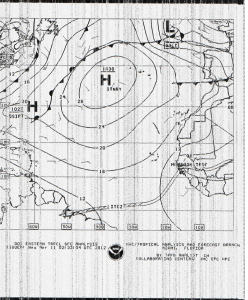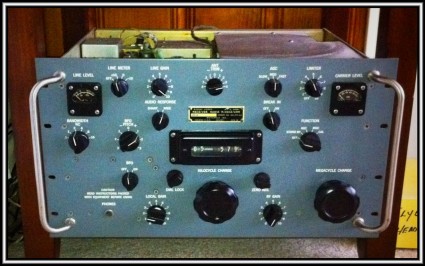Over the last week, I started playing around with JT65-HF. JT65-HF is a digital mode, which is good for only the most basic of information exchanges: grid square, signal levels, and perhaps a very short 73 message. But it’s got some cool features. It operates on low power, and can automatically log any callsigns you spot to a centralized location, rather like the WSPR propagation reporter. JT-65 writes records of all signals received in CSV format, and so you can mine them for all sorts of good information. I wrote a simple script that isolated all transmissions that specified a Maidenhead gridsquare, and then gathered them together all the callsigns that originated in each square. Over the last week, I’ve logged 453 unique callsigns, from 249 unique gridsquares. Not bad, for very low 40m dipole. Check it out!
BL01 KH6GRT, KH6SAT
BL11 KH6DC, KH6OO
BP51 KL5E, KL7YK
BP54 WL7BDO
CM87 WQ6C
CM88 KD6HQ, N6BX
CM94 KI4MI
CM95 KG6WIK
CM97 AK1P, K6EU, K6RF, KD6FTR
CM98 KJ6CC, KJ6RKZ, W6KAP
CN76 K7MSC
CN79 VA7HZ
CN82 K7TLP
CN84 AI7W, KF7JGF
CN85 K2NCC, K7FET, KE7WEG, W7JAZ, W7LHT, W7YES, WE1SH
CN87 AE7U, WA7SCH, WB7AJP
CN88 AC7SG, K3NDE, VA7RME
CN89 VA7EFV, VE7GMN, VE7NH
CO70 VA7JH
CO90 VA7AQD
DL80 XE1GZU
DL99 K5WW
DM03 WA6OWM
DM04 AG6EF, K6AZR
DM12 N3PV
DM13 K6RBS, KC6OVG, KD6MHL, W4EG, W6KY, WB6RLC
DM14 N6CVA
DM26 AG7CM, KS7DX, N7BPA
DM33 K3WYC, K7TEJ, N7AMA, N7GDP, NR5O
DM35 AE7CD
DM37 KK7H
DM41 N1LS
DM43 KM3N, N7NEV, N9CVB, W8FDV
DM49 KK7FC
DM62 WA5DJJ
DM65 WB2FKO
DM68 K0JY
DM78 W0KIT
DM79 AB0YM, KC0ZGK, KD0BIK, WB4CIW
DM91 K5OAI
DM95 WY5R
DN17 N7JFP, W7MEM
DN23 KF7GMV
DN31 KD7SXN, KJ7NO, N7JCO, NS7K
DN36 N7NSO
DN40 KJ2U
DN47 NT7R
DN71 WA7ZXL
DN84 K0JV, K7RE
DN98 W0TUP
DO33 VA6SZ, VE6SQ
EL07 K2OO
EL17 KF5IAK
EL18 NW5P
EL29 AE5RA, KB5UPS, KF5MDZ
EL49 KB5GA, W5ZPA, WB5NPW
EL86 NY4FD
EL87 KG4OXA
EL89 K3LUE, WB4RQD
EL95 AJ4WC, KK4CIS
EL98 AA4KN, KS4N, N4ABN, W2RXG
EL99 KG4Q
EM00 AC0WN
EM05 AA5CK
EM11 K5HGX, N6PL
EM12 K6VNG, NA5AA, W5AP
EM13 AC5T, KJ5XX, WA5MS, WA5PGS
EM15 AE5ZD, W7CNK
EM20 AA5KK
EM28 K0ASK, WB0ZPW
EM29 KB0PPQ, KD0AGX, W0PSK, WB0LCW, WB0ZYU
EM30 K5DDM
EM34 AE5ZZ
EM37 N0FYF
EM40 K5CJU, W5ADD
EM42 N5VEI
EM45 AE5RU, AE5SB, W5TT
EM47 N0NSR
EM48 AA0YY, AC0LP, K0TPP, W9MO
EM50 N4UPX, W5XN, W8DM
EM59 K9EEI
EM63 KF4RWA, KK4AFS
EM65 K4KQZ
EM67 W9ATB
EM69 N9WKW, WB9IIV
EM70 K4TFT
EM73 K4STA
EM74 AI4RJ, KB4KBS
EM78 K8LEN, K9AAN, N4MRM, N9DFD
EM79 N8XYN, W8JAQ
EM83 KS4GY
EM84 KD4YDD, KG6MC, W4DJW, WB2GJD, WB4ZWK
EM85 KJ4ZQX, N5FPW
EM88 KC8GCR, KD7YZ
EM92 K4BTC
EM95 KR4RO, W1HFB, WB4KJV
EM96 K4BSZ
EM99 WT8D
EN10 N0LWF
EN11 KA0VXK
EN21 WD0DMO
EN33 N0HD
EN34 W0OHU, WB0N
EN35 KC0YFC, N0OLE, ND0M
EN36 K0JWC
EN37 NA0F
EN41 KB0NAZ, KD0JHW, WA0EIR
EN42 AA0N, K8OM
EN43 WB9BJQ
EN44 KC9ECI
EN50 N9GUE
EN51 KA9BHD, KA9CCH, KB9MNM, KC9UDE, W9YNP, WA9MNF
EN52 K9JKM, KC9MEG
EN53 KA9SWE
EN55 WB9SDD
EN60 KA2EYH
EN61 KB9ILT, KC9OMS, N2BJ, WB9B
EN62 KC9IL
EN63 KD8OTT
EN72 N8BB
EN73 NZ8V
EN80 K0KC, NT8Z, W8DEL, W8KHR, W8MDG
EN81 KD8BIN, NM8W
EN82 AC8KR, KK8MM, VA3DAZ, VA3UG
EN90 WA3CAS
EN91 KG8IU
EN92 VE3FMC
EN93 VE3IYB, VE3ZUP
FD55 LU1XT
FD66 LU2XPK, LU2XSN, LU8XQL
FF45 CE4SFG
FF97 LU4FT
FG75 LU5OM
FI07 HC5VF
FJ78 YV6BFE
FJ79 YV5MM, YV6GM
FJ92 PV8AZ
FK52 PJ2MI
FM03 N4ITM
FM04 KS4S
FM08 KX4P
FM09 WK8G
FM16 K4MJ, K4VHV, KQ4ZH, N8XHF
FM17 K8SI
FM18 KB3FF, KG3BOZ, N3CAL, N3ES, W3YTS
FM19 AB3RS, W3FJD
FM28 AB3OF, KB3IWV, W3MLK, W3SJT
FM29 N2IDW, W3NRL, WA3QHJ
FN00 N3WLB
FN01 KB3MOW
FN02 VE3EBN, W2DLL
FN03 KC2ZUF, VA3LLZ, VA3PID, VA3WLD, VE3EK, VE3EQV
FN04 VE3NLS
FN10 K3MRK, KB3VNH, WD3K
FN11 K3KAA
FN13 VA3JLF, VE3EP
FN20 K2RWH, K8WHA, KB3TC, KC2WUF, KI2P, ND2K, NY3Z, W2GM, W3BI
FN25 VA3NRN
FN30 KA2DUT, KB2AMY, KC2MBV
FN31 KB1UUB, KC2QFR, WA1NGH
FN34 AB1NJ, KC2FZN, N1DNN
FN41 K1MGH, KA1ERL, W1UU
FN42 KB1ESR, KT1B, N1MGO, NJ1H, W1MSN
FN43 K1CF, KA1QW, W1WRH
FN44 N1GB
FN46 VE2PTB
FN53 N1IPA
FN74 VE1SKY
FN75 VE9DX
GF05 LU8ENU, LU8EX
GF15 CX8AF
GF49 PY3APY, PY3FBI
GG40 PY3OL
GJ25 PZ5RA
IL18 EA8OM
IM58 CT1FBK, CT1HMN
IM87 EA7GDC
IN52 EA1YV
IN80 EA4GB
IN95 F1MWV, F8RZ
IO62 EI3JB
IO64 MI3LDO
IO75 MM0AMW
IO82 G0HDB, G3NYY
JN01 EA3AQS
JN11 EA3NE
JN15 F5BOB
JN37 F6DKQ
JN46 DL1GHJ
JN47 OE9HGV
JN49 DJ9UN
JN55 IK2VTJ
JN69 OK1DX
JN88 OM2AOA
JO03 2E0ZRQ
JO10 F4BAL, F4FVH
JO11 PA0INA
JO21 PA3GAN
JO30 DF7KB
JO31 DK6CS, DL1EKZ, DO1IP
JO32 PA1NL, PD5T
JO45 OZ1TMK
JO51 DM2BPG
JO52 DL1AAH
JO53 DK6XY, DL1HCN
JO62 DD6AJ
JO82 SP3CUG
JP53 LA3LJA
KF26 ZS2EC, ZS2ND
KG43 ZS6BUN
KN95 RN6AM
KO14 LY2OT
KO72 R3WF
LN15 RV6FT
LO14 UA4UK
LO16 UA3TN
LO54 UA4PPQ
NJ84 YB6EN
OF78 VK6NAT
OI94 YC8HI
ON80 BA1PK, BG1QQT
PF94 VK5KGP, VK5NG
PM45 HL5BLI
PM53 JA6ATL
PM54 JH4BTI
PM63 JA5JGY, JA5TX
PM64 JA5AOA, JA5BDZ, JI4JGD
PM74 JA3LXJ, JA8CQM, JE3RNC, JH3OWW, JH3XYP
PM75 JA3BJZ
PM84 JA2IDR
PM85 JA0FOX, JA2JNT, JG2JSZ, JH2DBQ, JQ2HVN
PM94 JR2FVG
PM95 7J1ADS, 7J1BBC, JA1KXQ, JA1OYY, JA1PJS, JA1XIA, JA7FYU, JG1XSL,
JH1CJY, JH1KYA, JI1CPN, JP1QDH
PM96 JA1MOD, JG1PDG, JH0FSO
PN53 UA0LMO, UA0NL
PN68 UA0DBX
PN78 RA0CGY
QE37 VK7SM
QF22 VK3AMA, VK3BM
QF44 VK1DW
QF56 VK2AJF
QG39 VK4FNQ
QG62 VK4GC, VK4MJF
QG63 VK4LHD
QH30 VK4BDJ
QM05 JA1RNJ, JQ1HDR, JR3ELR
QN12 JA8LN
QO59 UA0IT
RE66 ZL3AB, ZL3NB

